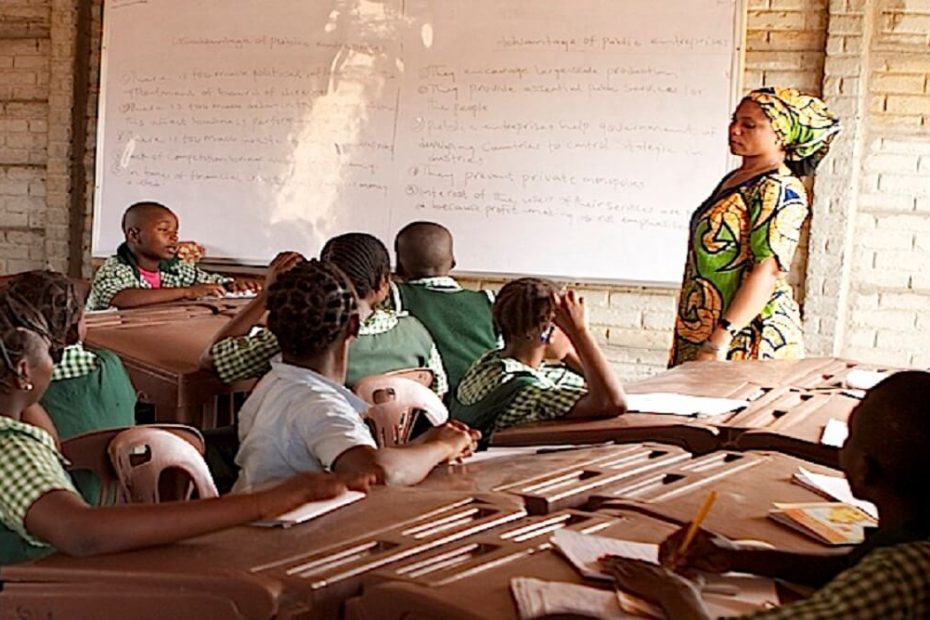The education system in Nigeria is plagued by crumbling infrastructure and unfavorable working conditions, creating a dismal state of affairs.
According to UNICEF, Nigeria holds the unfortunate distinction of having one out of every five out-of-school children worldwide. Despite primary education being officially free and compulsory, approximately 10.5 million Nigerian children between the ages of 5 and 14 are not attending school. Moreover, there are millions who receive only a partial education due to the deteriorated state of the educational system. Education, widely recognized as the foundation of development, has regrettably been neglected in Nigeria. This neglect is primarily attributed to poor funding and neglect, resulting in inadequate classrooms, ill-equipped or non-existent learning facilities, unqualified teachers, unfavorable learning environments, and social issues such as strikes and cultism. The educational sector has witnessed various policies implemented by successive governments since independence, some of which have shown promise. However, poor implementation, corruption, misappropriation of funds, and a lack of commitment have consistently hindered progress.
Furthermore, a closer examination of school activities reveals additional problems, including exam malpractices, frequent strikes, and a lack of student motivation. These factors have contributed to the downfall of the educational system in Nigeria. It is disheartening that due to a faulty system, students sometimes spend six years studying a four-year course. Consequently, many young individuals aspire to study abroad as the educational system in Nigeria has crumbled, leading to a high rate of unemployable graduates. This situation arises because the educators themselves are often ill-prepared or lack the necessary skills to provide quality education.
The state of education in Nigeria is a cause for concern, with the dilapidated infrastructure, inadequate resources, and other challenges hindering the development of a robust and effective educational system. Addressing these issues requires a comprehensive and concerted effort from the government, policymakers, educators, and stakeholders to prioritize education, increase funding, improve infrastructure, enhance teacher training and qualifications, and foster an environment conducive to learning. Only then can Nigeria hope to restore its education system and provide its youth with the knowledge and skills necessary for a brighter future.
What can be done?
To bring about meaningful development in the education sector, several steps can be taken. Firstly, the government needs to address the issue of funding by allocating a significant portion of the national budget to education. Adequate funding will enable the improvement of infrastructure, technology, teacher training, and research initiatives, allowing the educational system to compete globally. Encouraging private-public partnerships in education can also provide additional resources and expertise.
It is crucial to promote technical and hands-on education, moving away from a solely theoretical approach. Establishing and adequately funding technical adaptation centers will equip students with practical skills that align with the demands of the job market.
Investing heavily in technology for both learning and teaching is essential to keep pace with global standards. Embracing digital tools, online resources, and interactive platforms will enhance the learning experience and ensure students are prepared for the digital age. Additionally, prioritizing research and providing necessary support and funding for research initiatives will contribute to the socio-economic, political, scientific, and technological advancement of Nigeria.
Overall, a comprehensive approach involving government commitment, private sector involvement, increased funding, technical education, and technological integration is necessary to revitalize the Nigerian education system and propel it toward excellence and global competitiveness.
Conclusion
In conclusion, the educational system in Nigeria faces significant challenges, including infrastructural decay, inadequate funding, and a lack of qualified teachers. These issues have contributed to a large number of out-of-school children and a diminished quality of education. To address these challenges and promote meaningful development in the education sector, several actions need to be taken.
Firstly, the government must prioritize education and allocate sufficient funding to address infrastructure needs, provide necessary resources, and support research initiatives. Encouraging private-public partnerships can also bring additional resources and expertise into the system.
Technical and hands-on education should be promoted to equip students with practical skills that align with the demands of the job market. Investing in technology for both learning and teaching is crucial to prepare students for a digital world and enable global competitiveness.
Furthermore, fostering a culture of research and providing adequate support and funding for research initiatives will contribute to the overall advancement of the nation across various fields.
Ultimately, a comprehensive and collaborative approach involving government commitment, private sector involvement, increased funding, emphasis on technical education, and integration of technology is essential to revive the Nigerian education system. By addressing these issues and implementing effective reforms, Nigeria can provide quality education to its youth, empower them with the necessary skills, and pave the way for a brighter future of development and growth.
